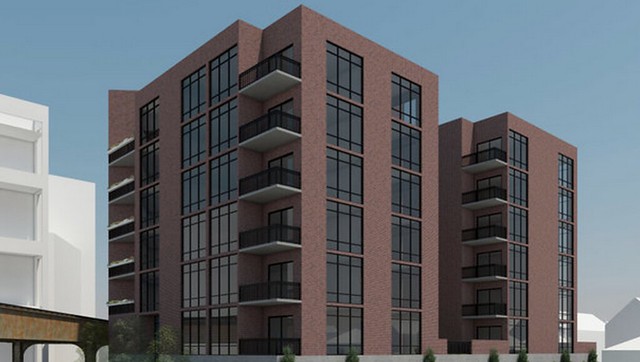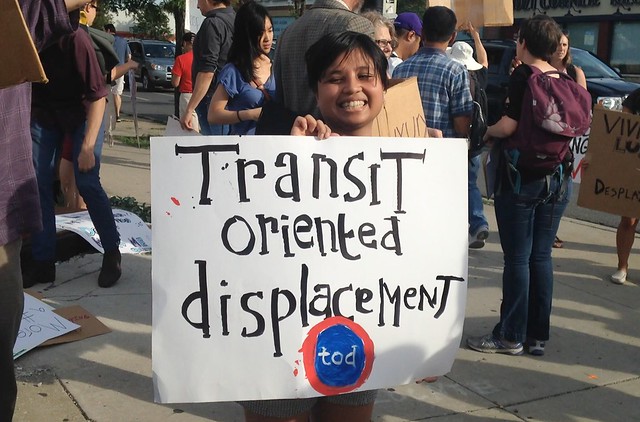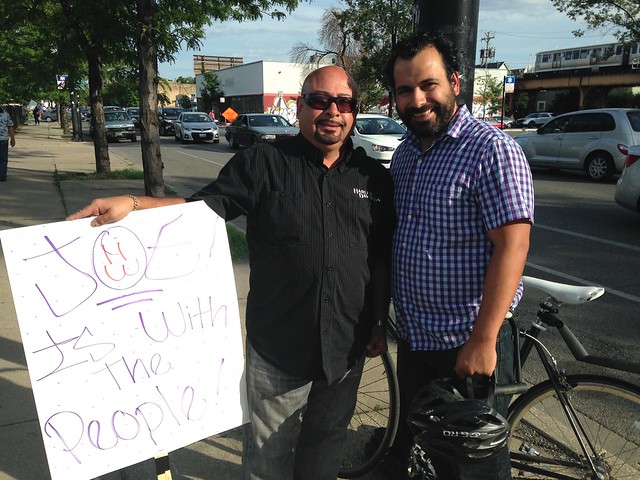First Ward Alderman Proco "Joe" Moreno has been one of Chicago’s leading proponents of transit-oriented development. He sponsored the city's 2013 TOD ordinance, and he’s been a strong supporter of dense, parking-lite developments near ‘L’ stops in his district. He’s also one of a handful of aldermen who don’t approve zoning changes for new housing developments unless ten percent of the units are affordable, rather than letting the developer opt out by paying into the city's affordable housing fund.
Several upscale TOD developments are in the works near the California Blue Line stop in Logan Square. In all of the proposals, about ten percent of the housing units would be affordable. These projects take advantage of the current TOD ordinance (Mayor Rahm Emanuel recently proposed a more robust ordinance) by including only one or fewer parking spaces for every two units. The proximity to transit and lack of excess parking spaces would make it easy for new residents to live car-free, and would discourage them from bringing more cars into the neighborhood. Here's a chart of the new developments by Streetsblog's Steven Vance:
| Address | Phase | Units | Aff. Units | Spaces | Ratio |
|---|---|---|---|---|---|
| 2211 N Milwaukee Ave | Under construction | 120 | 12 | 60 | 0.50 |
| 2293 N Milwaukee Ave | Alderman must approve | 213 | 21 | 68 | 0.32 |
| 2328 N California Ave | Approved but new proposal | 135 | 14 | 48 | 0.36 |
| 2841-45 W Belden Ave | Proposed | 95 | 10 | 44 | 0.46 |
| 2240 N Milwaukee Ave | Proposed | 40 | ? | 31 | 0.78 |
As in many neighborhoods where TOD has been proposed, there's been stiff opposition from neighbors who fear that dense housing with limited car spaces would lead to traffic and parking headaches. In Logan Square, these opponents have been joined by community activists who have argued that adding large amounts of high-end housing will fuel gentrification in the neighborhood by raising property values, property taxes, and rents.
It’s true that these new developments will make it easier for new residents to find homes in Logan Square and, since the rents for market-rate units in these new-construction buildings will be relatively high, these newcomers will be relatively affluent. That will likely lead to more amenities in the neighborhood, like upscale retail, that will encourage other middle- and upper-income people to settle in Logan.
On the other hand, the neighborhood is already gentrifying rapidly and, arguably, building new units will take some pressure off the housing market. This could reduce the incentive for landlords to raise rents in existing buildings, forcing out lower-income residents. It’s hard to predict how much the gentrifying effects of these new buildings would be mitigated by the phenomenon of an increased housing supply reducing demand.
Anti-gentrification activists in Logan Square have called for including a higher percentage of affordable housing units in these projects, and have advocated for changing the standards of what constitutes “affordability” in order to make the units more accessible to low-income people. The city’s Affordable Requirements Ordinance currently dictates that affordable rental units must be within the means of households earning up to 60 percent of Area Median Income.
However, some of the activists have also called for reducing the size of the developments. Moreno says that’s counterproductive, arguing that density makes it feasible for developers to provide on-site affordable housing. “I need tools as the alderman to be able to bring affordable housing — I can't just advocate for it,” he recently told DNAinfo. “Those who advocate for affordable housing and don’t advocate for density — they don’t get [affordable housing]. They're shooting themselves in the foot.”
Last night after work, the grassroots group Somos ("We Are") Logan Square held a “March on Moreno” protest against the TOD projects. “Alderman Moreno is a fake progressive touting fake affordability,” read the Facebook event. “He has been approving one massive luxury development after another, and if we don't stop him, these projects will cause rents, property taxes and real estate speculation to skyrocket across the neighborhood.”
A couple dozen protesters gathered near the California stop, holding placards with slogans like “Community says no, Joe,” “Upzoning equals uprooting communities and families,” and “Transit-oriented displacement.” They were met by a march made up of a roughly equal number of Moreno supporters holding signs with messages like “We want progress, we want Joe” and “First Ward leads the way.”
For a few minutes, the two groups faced off in a shouting match. The anti- faction chanted “Moreno, escucha, somos en la lucha” (“Moreno, listen, we are in the struggle”). The alderman’s supporters shouted a similar, pro-Moreno phrase in Spanish, as well as the less-catchy “Fifteen-dollar minimum wage, TOD, ban the [plastic] bags, affordable housing – sounds progressive to me.” After a pause, the two groups marched to Moreno’s ward office at 2058 North Western, where there was another confrontation.
During the break in the battle, a couple of participants shared their perspective on TOD. Camilo Ferro, who owns a composting and compostable packaging business, was among the Moreno supporters, and he said he’s in favor of more development near transit. “Everything I do in my life is focused around sustainability and further developing community for sustainable purposes,” he said. “Having a business or housing next to public transportation gives you different access points throughout the entire city, and you don’t have to worry about driving or a parking lot.”
Ferro said that the claims that the TOD developments will cause displacement are unfounded. “I think it’s a bogus argument, because there will be affordable housing in these locations,” he said. “By bringing these developments and the opportunities for different retailers to come in, you’re just putting more [investment] into the local community.”
Hafizzah Omar, who works for a philanthropy-related organization, is part of the anti-gentrification group. She said she’s in favor of building dense housing near transit as a strategy to reduce car dependence. “But what we’re protesting is that there have been people living near the Blue Line for so many years, and these people will be displaced by this coming transit-oriented development.”
Omar argued that a higher quantity of more-affordable units are needed in these buildings. “That’s why we’re targeting the alderman and the developers, because the argument is always that there’s not going to be enough profit if they do something that’s affordable, but that’s not true.” She added that while Somos Logan Square would like to see 50 percent affordable units in these buildings, she understands that’s probably not viable. “More than ten percent, definitely, but we would like to negotiate to like 30 percent.”
“We’re not against density, we’re not against development, and we’re definitely not against people using transit more and driving less,” Omar concluded. “What we want is equitable development, so that no one is getting displaced.”







